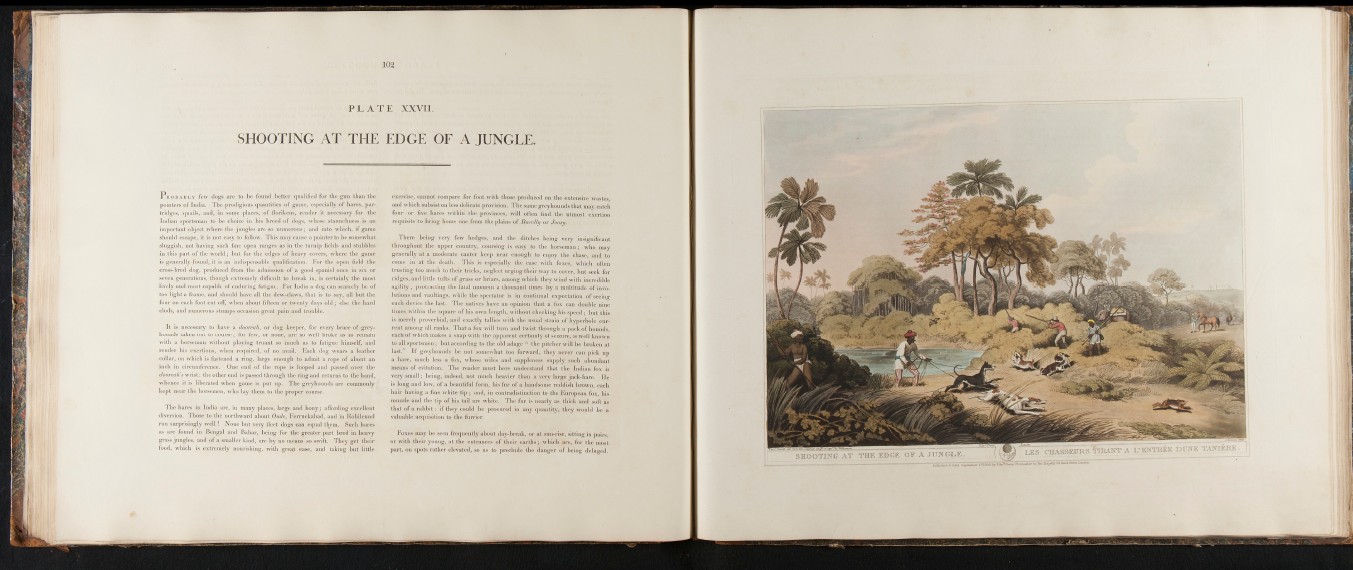
P L A T E XXVII.
SHOOTING AT THE EDGE OF A JUNGLE.
PROBA HLV few dogs arc lo be found Ijcller qualified for the gun lhan llic
|>uiiilors of India. The prodigious (]iianlilies of game, especially of hares, par-
Iridgi^s, ([uails, and, iu some places, of tlorikens, render it necessary for the
Indian sporlsmaii lo be clioice in his breed of dogs, whose staunchness is an
imporliinl objecL \vliere llie jiiiigles are so numerous ; and inlo which, if game
should escape, it is not easy lo follow. This may cause a pointer to b e somewhat
sluggish, not having siicii fine open ranges as in ihc lurnip fields and stubbles
iu lliis part of the world; but for the edges of Ijcavy covers, where the game
is generally found, it i.s an indispcusable qualificalion. For the open lield the
cross-bred tlog, produced froui the aduiission of a good spaniel once in six or
seven generations, tliougli exirouicly diilicull to break in, is certainly the most
lively UIKI most capable of enduring fatigue. For India a dog can scarcely be of
too ligli' a frame, and tthould have all the dew-claws, that is to say, all but the
four on each fool cut otV, w hen about fifteen or twenty days old ; else the hard
clods, and numerous stumps occasion great pain and trouble.
I t is necessary to have a Jooreah, or dog keeper, for every brace of greyhouuds
taken out to course; for few, or none, are so well broke as lo remain
with u horseman wilhoul playing truant so much as lo fatigue himself, and
r e n d e r his exertions, when required, of no avail. Each dog wears a leather
collar, on whicli is fastened a ring, large enougl) to admit a rope of about an
incli in circumference. One end of the rope is looped and passed over the
(horeuh's \vns\.\ ibe o ther end is passed through the r ing aud returns to theliand,
whence it is liberated when game is ])ut u]). I'lie greyhounds are commonly
k e p t near ihe horsemen, who lay them to the proper course.
T h e hares in India are, in many places, large and bony; affording excellent
tliversiou. Tliosc to the northward about Ou<Jc, Fer ruckabad, and in Rohilcund
r u n surprisingly well ! None but very ileet dogs can equal lliem. Such hares
as arc found in Bengal and Bahar, being for the greater part bred in lieavy
grass jungles, and of a smaller kind, are by no means so swift. They get their
food, which is extremely nourishing, with great ease, and taking but little
exercise, cannot compare for foot with those produced on the extensive wastes,
and whicli subsist on less dclicate provision. The same greyi iounds tlnit may calch
four or five liarcs within the provinces, will often find the utmost exertion
r e q u i s i t e to bring home one from the plains of Barclhj or Jooaij.
T h e r e being very few hedges, and the ditches being very insignificant
t h r o u g h o u t the upper country, coursing is easy to the horseman ; who may
g e n e r a l l y at a moderate canter keep near enough lo enjoy the chase, aud to
come in at the death, This is especially tlie case with foxes, which often
t r u s t i n g too much to their tricks, neglect urging their way to cover, but seek for
ridges, and little tufts of grass or briars, among which they wind with incredible
p r o t r a c t i n g the fatal moment a thousand limes by a multitude of invol
u t i o n s and vaultings, while the spectator is in continual expectation of seeing
each device the last. The natives liave an opinion that a fox can double nine
times within the square of his own IcMiglh, wi thout , checking his speed ; but this
is merel y proverbial, and exactly tallies Avith the usual strain of hyperbole curr
e n t among all rank.s. That a fox will turn and twist through a pack of hounds,
each of which makes a snap with ihe apparent certainty of seizure, is well known
to all s])ortsmen ; but according to the old adage " the pitcher will be broken at
l a s t . " If greyhounds be not somewhat loo forward, they never can pick up
a hare, much less a fox, who.se wiles and sup[)lcness supply such abuiulaut
means of evitation. The reader must here understand that the Indian fox is
v e r y sm.'dl ; being, indeed, not much heavier than a very large jack-hare. He
is long and low, of a beautifid form, his fur of a handsome reddi.sh brown, each
h a i r having a fine whi t e tip ; and, in contradistinction to the European fox, his
muzzle and the tip of his tiiil are white. 'I'he fur h nearly as thick and soft as
t h a t of a r abbi t : if they could be procured in any quantity, they would be a
valuable acquisition to the furrier-
Foxes may be seen freipienlly about day-break, or at sun-rise, sitting in pains,
o r wi t h their young, at ihe untrance.s of their earths ; which arc, for the most
p a r t , on spoLs rather elevated, so as to preclude the danger of being deluged.
m
IJIIL
m
LES"^CHASSE0KS ILBANT A L-EWTHÉK DPKE TANIÈRE.
•Îl